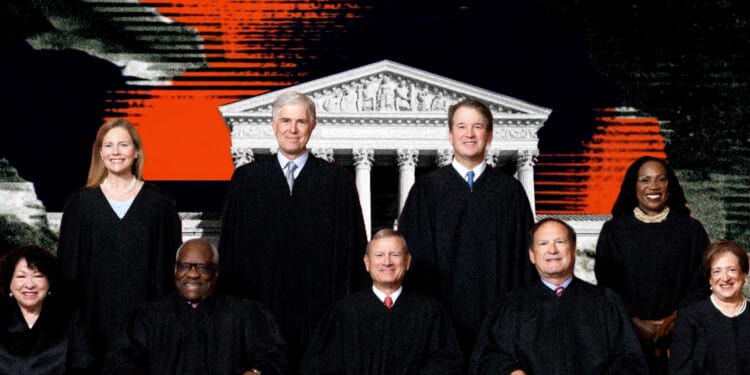It’s always unwise to predict the outcome of a U.S. Supreme Court case based solely on what happened during oral arguments. So let’s go ahead and attempt it anyway.
You’re reading Injustice System from Damon Root and Reason. Get more of Damon’s commentary on constitutional law and American history.
I tuned in to yesterday’s high-stakes oral arguments over President Donald Trump’s tariffs, expecting to find Justices Clarence Thomas and Samuel Alito signaling their strong support for the president’s broad claims of executive power. And that’s exactly what Thomas and Alito did: We can expect them to vote for Trump.
Along similar lines, I expected Justices Elena Kagan, Sonia Sotomayor, and Ketanji Brown Jackson to signal their strong opposition to Trump’s position. And that’s exactly what they signaled, too. We can expect them to vote for the legal challengers.
But I wasn’t so sure about what to expect from the remaining four justices.
I figured that Justice Brett Kavanaugh would be at least somewhat sympathetic to the president’s claims of executive power, given Kavanaugh’s own view that the president should receive broad judicial deference when foreign affairs are involved.
One big question for me going into yesterday’s arguments was thus whether Kavanaugh would buy Trump’s argument that his sweeping tariffs do fully implicate foreign affairs. Based on the oral arguments, Kavanaugh appeared to buy what the Trump administration was selling. Kavanaugh now seems to be a more likely vote for Trump.
I figured that Justice Amy Coney Barrett was going to be more of a toss-up, and so she was. She grilled both sides sharply and seemed open at times to the kind of reading of the International Emergency Economic Powers Act that could favor Trump’s tariffs. And there were also times when she seemed in harmony with Kavanaugh, which was also a good sign for Trump.
But Barrett also seemed disinclined toward Trump’s position at other points, and questioned whether the federal law invoked by Trump could be reasonably understood to allow him to impose such tariffs at all. For me, Barrett’s vote is too close to call.
I knew that Chief Justice John Roberts would be worth a very close study, and I wasn’t wrong about that. As I’ve previously noted, Roberts’ long career on the bench has found him to be both friend and foe to executive power. He seemed more comfortable in the foe position yesterday, although he gave the legal challengers a hard time, too.
But Roberts seemed to go hardest against Solicitor General John Sauer. “You have a claimed source in [the International Emergency Economic Powers Act] that had never before been used to justify tariffs,” Roberts told the Trump official. “No one has argued that it does until this—this particular case.” And, Roberts added, “the basis for the claim seems to be a misfit” with the federal law. As Roberts put it, “the exercise of the power is to impose tariffs, right? And the statute doesn’t use the word ‘tariffs.'”
Those are not words that Sauer wanted to hear coming from the mouth of the chief justice. I’m not making a firm prediction here, but I could definitely see Roberts voting against Trump based on what happened yesterday.
Now let’s talk about Justice Neil Gorsuch, who, in my view, stole the show. Shortly before yesterday’s oral arguments kicked off, I wrote that if Gorsuch “lean[s] in on non-delegation and separation of powers concerns,” it would mean that “Gorsuch may vote against Trump.”
Well, Gorsuch certainly leaned in. Under “your theory of the Constitution,” Gorsuch demanded of Sauer, referring to the Trump official’s repeated invocation of Trump’s inherent power over foreign affairs, “what would prohibit Congress from just abdicating all responsibility to regulate foreign commerce, or for that matter, declare war to the President?”
A few minutes later, Gorsuch pressed Sauer on the inevitable implications of Trump’s claim that Congress had actually delegated such unbridled tariff authority to the executive. “Don’t we have a serious retrieval problem here,” Gorsuch asked, “because, once Congress delegates by a bare majority and the President signs it—and, of course, every president will sign a law that gives him more authority—Congress can’t take that back without a super majority. And even—you know, even then, it’s going to be veto-proof. What president’s ever going to give that power back? A pretty rare president.”
In short, Gorsuch stated, “Congress, as a practical matter, can’t get this power back once it’s handed it over to the President. It’s a one-way ratchet toward the gradual but continual accretion of power in the executive branch and away from the people’s elected representatives.”
Those words must have set off major alarm bells for Sauer because Gorsuch basically argued that the logic of Trump’s position was totally poisonous to the constitutional separation of powers. The phrase “no kings” comes to mind.
Then, some two hours later, as the oral arguments were winding down, Gorsuch spoke up in support of one of the key arguments advanced by the legal challengers. Here is the relevant exchange between Gorsuch and that lawyer:
JUSTICE GORSUCH: It does seem to me, tell me if I’m wrong, that the really key part of the context here, if not the dispositive one for you, is the constitutional assignment of the taxing power to Congress, the power to reach into the pockets of the American people is just different and it’s been different since the founding and the Navigation Acts that were part of the spark of the American Revolution, where Parliament asserted the power to tax to regulate commerce…and Americans thought even Parliament couldn’t do that, that that had to be done locally through our elected representatives.
Isn’t that really the major questions, nondelegation, whatever you want to describe it, isn’t that what’s really animating your argument today?
MR. GUTMAN: I think it’s a huge piece of what’s animating our argument. Thank you.
When a justice takes the time to restate an advocate’s key argument even more eloquently and forcefully than the advocate himself has managed to do during oral arguments, that is a very strong indication that the justice is sympathetic to that argument. Put differently, Gorsuch likely views Trump’s tariffs as a violation of both the separation of powers and the nondelegation doctrine and is therefore much more likely to rule against them.
In sum, the legal challengers had a good day in court. And it’s certainly conceivable that the challengers will win over Trump, perhaps by a 5-4 vote with Gorsuch and Roberts (or Barrett) joining Kagan, Sotomayor, and Jackson.
Now we just have to wait and see.

















